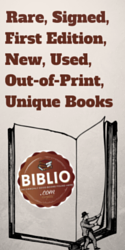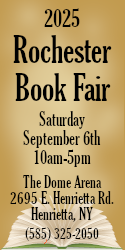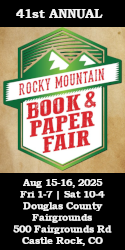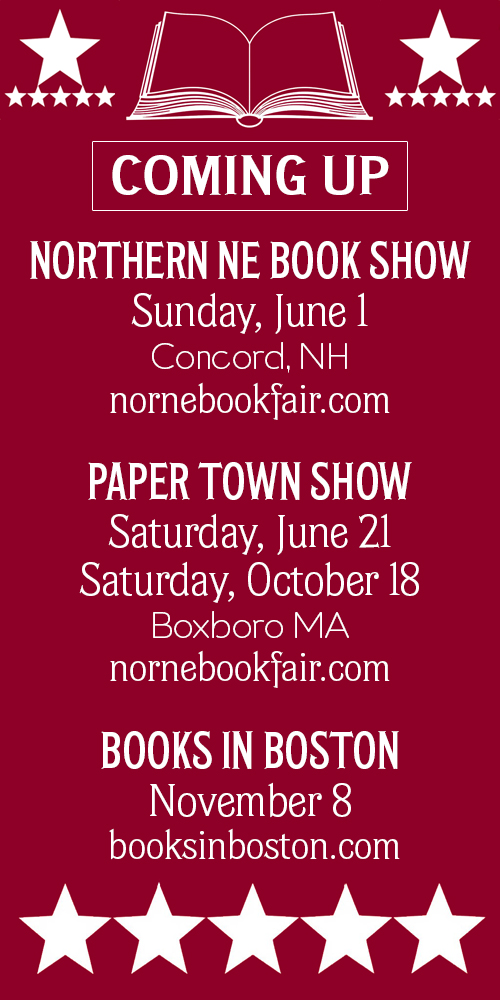A Scottish Play?
Ogilvy, Alexander. Oor Wully: The Scotsman who wrote William Shakespeare's plays. (Kincardine Press, Edinburgh 2014).
On the Shakespeare bandwagon, which publishers on both side of the Atlantic have trundled out this year to celebrate William's 450th birthday, there are two new books of particular interest to me, and probably to you too, if you love a good yarn, involving secondhand bookdealers hitting paydirt – or possibly not – but certainly doing their best to spin their straw into gold.
The first you will almost certainly know about. Shakespeare's Beehive : A Compleat Recording of the Annotations (Lightning Source, 2014) tells of two American bookdealers' scoop purchase on e-Bay of a sixteenth-century dictionary, annotated in contemporary manuscript, some of which may be William Shakespeare's. If so, this dictionary may well have belonged to Shakespeare and may well have served as his personal thesaurus. And if all this is true, (and it is a pretty big if) Messrs. Koppelman and Wechsler's outlay of some four thousand dollars may one day magically convert into a nice sale reaping (perhaps) some twenty-four million. Meanwhile they are reaping some nice dollars from telling the story. Good work.
The second book, Oor Wully: The Scotsman who Wrote William Shakespeare's Plays you will certainly hear about soon, if you have not already. It appeared on the first of April and has fairly set a cat among the pigeons, claiming that the plays written by William Shakespeare (“Oor Wully” is the Scottish vernacular for “our William”) were written not by an Englishman born in Stratford-upon-Avon but by a Scotsman born in Edinburgh. Given that later this year Scots will vote on whether or not to remain in the union, and that many English people (as well as Scots) will be devastated by the idea of a United Kingdom shorn of Scotland and still more by the idea of the Shakespearean canon shorn of an English Shakespeare, Ogilvy's book is provocative, both in thesis and in timing.
Is it just another preposterous claim from a member of the 'Shakespeare was not Shakespeare' brigade? No-one is a more wilful (ahem) sceptic of the claims of this brigade than I am. And yet, as I read this entertaining book, I became just a bit less sceptical. It is an astonishing book which tells a remarkable story. But can it really be true?
I am not spoiling the story by revealing straight away that – according to Ogilvy – the Scotsman who wrote Shakespeare's plays was a royal person, King James VI of Scotland, because in the first sentence of the book Ogilvy tells us so. James VI was born in 1566, two years after Shakespeare, and he died nine years after him in 1625. He became King James I of England, Wales and Ireland, on the death of his distant cousin Queen Elizabeth in 1603, (Henry VII was her grandfather and James's great-great grandfather). So the suspense lies not in the question “Who?” but in the questions “Why? How? Where? Can you prove it?” And in answering these questions Alexander Ogilvy weaves a web in which I for one became delightfully entangled.
Ogilvy is not an academic, nor a professional author (writer). He is a secondhand bookseller, owner of The Auld Wee Quair Bookshop, in Inverness, Scotland. He tells us that “Wee Quair” is Scottish dialect for “Small Book” (good to know, as it would be easy to get this wrong). He tells us too that the shop name consciously echoes the title of a famous “tender and passionate” collection of poems, The Kingis Quair, written by King James I of Scotland, an ancestor of James VI. Literature in the blood? Yes, indeed: the pedigree is impressive. Another ancestor, Margaret of Scotland, married to the Dauphin of France, was a noted poet, and James VI’s mother was the beautiful, lively and multi-talented Mary, Queen of Scots, widowed Queen of France, a literary and poetic star, who published numerous poems, mainly in French, highly regarded in their time but now mostly lost.
In the autumn of 2010, Ogilvy was engaged to catalogue the antiquarian library of Sir Donald Trewes, Bt. at Teaninich Castle, near the village of Alness, some thirty miles north of Inverness, in the Highland region of Scotland. It was a task which was to occupy him for the following five months. His description of his time at Teaninich is delightful, and is one of the best parts of the book. Ogilvy writes amusingly of Sir Donald and his entourage, which includes six children, a one-legged gardener, a beautiful German au pair girl, and a Philippino ex-priest who serves as cook/butler/housekeeper. The treasures in the Trewes library appear somewhat humdrum compared with this rich cast of characters and their goings-on. That is, until Ogilvy stumbles across the secret collection of erotica formed by the third baronet, “Mad Sir Archie”, and just saved, by the fourth baronet, from the bonfire which Sir Archie’s widow had prepared for it. What Ogilvy finds, tucked in between the leaves of an Aldine Press edition of Boccaccio’s Decameron, illustrated by Botticelli, is the evidence, which underpins Ogilvy's book: namely, seven manuscript receipts, dating from the 1590s and the early 1600s , which show that King James paid, at regular intervals, a certain “Mr. W.S., Player” a sum totaling more than six hundred pounds, for “Attendance on His Majestie” and other “Services to His Majestie” which are, unfortunately, unspecified. The receipts are not signed by Mr. W.S. but by a series of assorted agents acting for him, who Ogilvy identifies, plausibly enough, as associates of William Shakespeare. And it is Ogilvy’s confident claim that the money paid to Mr. W.S. was a kind of “hush money” to enable King James to maintain his anonymity as playwright, and to reward Mr. W.S. for posing as the “true begetter” of the king's plays which his company of players so competently performed.
This is exciting stuff. But the discovery of these scraps of paper, folded into the pages of an incunabulum, does not equate to, say, the discovery of the Boswell Papers at Malahide Castle in the 1950s. That was a literary treasure trove indeed. But they enable Ogilvy to set off on a splendid chase. He shows that William Shakespeare almost certainly did visit Edinburgh on two occasions, in 1589 and in 1599, as a member of a company of players despatched north by Queen Elizabeth to the court of James VI “the player king” (as he describes himself in his Baslikon Doron published in 1599). Shakespeare may well have travelled to Edinburgh too in 1601, when James summoned from London a troupe of actors managed (probably) by Fletcher and Martin.
That King James knew William Shakespeare personally is almost incontestable: Shakespeare was one of the company of nine actors, The Chamberlain's Men, to whom King James gave letters patent only two months after ascending the English throne and who thereafter were known as The King's Servants and, subsequently, as The King's Men. Ogilvy quotes Gloucester's greeting to King Lear: “What, hath your grace no better company?” To which King Lear replies: “What better company could there be than The King's Men?” Which Ogilvy interprets as a nice in-joke between James and his new troupe. The famous Amicable Letter in which James compliments Shakespeare on his play Macbeth, is in Ogilvy's opinion stylistically much more amicable than formal: not at all that of a great monarch talking down to a lowly player, rather that of one man of the theatre talking on level terms – almost – with another. That the king and Shakespeare had social contacts in common is equally certain. Two of Shakespeare's patrons, the Earl of Southampton and William, Earl of Pembroke, were English courtiers, ‘favourites’ with whom King James was closely connected. And so on.
What new information on King James has Ogilvy dug up? Not much, but he stitches together a charming tapestry of anecdote, historical fact, conjecture and psychological speculation which more or less hangs together. King James, unlike William Shakespeare, was given a solid education, with a strong emphasis on the classics, history and literature: he learned, and was fluent in, Latin, Greek and French. His private tutor was the celebrated academic George Buchanan. In 1584, aged just eighteen, James published his first book: Some Rules and Cautions to be Observed and Eschewed in Scottish Prosody. There followed many more, including a book of poems His Majesties Poetical Exercises at Vacant Hours (1591), the famous diatribe against witches Daemonologie (1597) and the still more famous A Counterblast to Tobacco (1604). This, then, was a literate, scholarly king, dubbed “the wisest fool in Christendom” but who had a real passion for language and literature. At Holyrood Palace, he was patron of ‘The Castalian Band’, a group of poets and musicians who performed regularly and who, along with professional actors, enriched the cultural life of court and of Edinburgh. All this to the dismay of puritanical Calvinists and Covenanters, for whom theatre and music-making, and any sort of fun, were works of the devil.
Ogilvy quite rightly makes much of the fact that this was the king who sponsored the great translation of the Bible, the version “authorized by King James”, published in 1611, which did as much as, if not more than, “Shakespeare’s” plays to elevate and enrich the English language. And did you know that Psalm 46 contains a secret message from James to his player, Mr. W.S? Count from the beginning: you will find that the 46th word is “Shake”. Count back from the end, and you will find that the 46th word is “spear”. A neat and elegant tribute from a King to his actor friend and front-man who, in 1610, was aged 46? Ogilvy, to his credit, is non-committal.
King James’s wife was Anne of Denmark. He married her in 1589, two years after his mother, Mary Queen of Scots, was executed by order of Queen Elizabeth. The wedding took place in Denmark, at the castle of Elsinore. Yes, at that very one, Hamlet's castle. Ogilvy investigates at some length the connections – historical and psychological – between James VI and Hamlet, and the troubled relationship of James and Anne, which produced ten children, of whom only a handful survived into adulthood. Ogilvy concludes that James was almost certainly bi-sexual. He had close and probably sexual relationships with a number of male courtiers, including the Duke of Lennox, the Earl of Somerset and George Villiers, Duke of Buckingham. Interesting, and telling, says Ogilvy, that in his Basilikon Doron, James singles out sodomy as the one crime “ye are bound in conscience never to forgive”.
That the author of The Sonnets was bisexual is hardly open to doubt. But the identity of W.H., to whom The Sonnets are dedicated, certainly is. Ogilvy argues persuasively – perhaps conclusively – that W.H. is, or was, William Heriot, younger brother of King James's jeweller and goldsmith, George Heriot (1563 – 1624). George Heriot, known in Edinburgh as “Jinglin' Geordie” because of the way he rattled the coins in his rich pockets, was a stunningly successful goldsmith, who in 1597 was appointed goldsmith to Queen Anne, and shortly thereafter to King James himself. When James became King of England in 1603, George Heriot followed him to London and continued to reap large profits there. When he died he left twenty-three thousand, six hundred and twenty-five pounds for the founding of a hospital and school in Edinburgh for “faitherless bairns” and for “sons of poor burgesses.” The charity still exists and Heriot-Watt University commemorates his name. Of George's nine siblings not much is known, except for what Ogilvy, with remarkable diligence, has unearthed about brother William. Probably through George's influence, William gained a position in service to the King, and in 1598 is mentioned as “Third Groom to the King's Bedchamber.” Ogilvy also shows that the nursery rhyme “Wee Willie Winkie runs through the town” is almost certainly a satirical ditty, with clear innuendoes about Willy Heriot and his homosexual promiscuity. What is clear too is that Willy Heriot was a remarkably handsome, flighty and feckless individual, and that he was feted, dated and eventually bedded by King James. And when he refused to follow his King (and his brother) to London, he broke the king's heart: the Sonnets (writes Ogilvy) are the cries of anguish of an abandoned lover, full of bitter irony in lines such as the closing couplet of Sonnet 29:
For thy sweet love remember'd such wealth brings
That then I scorn to change my state with kings.
Ogilvy shows that one purpose of James's only return to Scotland (in 1617, a year after Shakespeare's death) was to call on Willie Heriot, as he lay dying in the Greyfriars infirmary, and bid him farewell.
All this is very fine and interesting. Interesting too (but tedious) are the computer-generated statistics Ogilvy presents which show a high correlation between the vocabulary of “Shakespeare's” plays and the vocabulary of the writings published in King James's own name: and that common words from the Scottish vernacular (‘wee’, ‘lassie’, ‘bairn’, ‘thrawn’ etc.) are conspicuously absent from both. Clever stuff. Yes, indeed, King James could have written these plays, but in God's name, why would he? And why would he do so anonymously? And why would he pay William Shakespeare to front for him?
To answer these questions, Ogilvy invites us as spectators into the analyst's consulting room. Lie down here, please, James (may I call your Majesty James?). Let's call up your past. Remember that your father was blown up and killed, while you were in your mother's womb. Recall that your own mother organized this gunpowder plot, the murder of your own father. While this horror was actually happening, your mother (with little you inside her) was being entertained by actors at Holyrood Palace watching a masque, a play, a fantasy. Blood on her hands, which not all the perfumes of Arabia.....you know the rest. So you never knew your father, and he never knew you. How do you feel about that? You grew up fatherless, and more or less motherless. Because you hardly knew your mother either. She abandoned you when you were two years old and you never saw her again. She spent the rest of her life as a prisoner in England. And when you were 21, her head was cut off. Blood everywhere. Imagine it. Of course you can. Imagination is what you do. You escaped into a world of fantasy, a world of play and playing, you are the player-king, the king of plays and players. You pour your grief and your anguish into the writing of plays. You are Hamlet, Julius Caesar, King Lear, King Henry IV, Prospero, Antony, and Macbeth. Your life, your destiny is theirs: you the Protestant king, born of a Catholic mother, ducking and weaving your way between Papists and Presbyterians, French and English, clinging to power in troubled times. Privately you dabble in witchcraft, sodomy, nicotine: publicly you rail against them. You know what historian Macaulay wrote of you? “He was indeed made up of two men – a witty well-read scholar who wrote, disputed and harangued, and a nervous drivelling idiot who acted.” But it was a pretty good act, all the same, behind a pretty good mask. You had everyone fooled, James. And you had the wit to have the First Folio published in 1623, two years before your death, a lasting memorial (as Ben Jonson writes in the Preface) of
Those flights upon the banks of Thames
That so did take Eliza and our James.
Are you, the reader, convinced? Well, if this is the sort of thing you like, you may well be. And you will certainly find more evidence of substance in Ogilvy's detailed analysis of the Trewes Library receipts and in his further research which took him to the W.S. Library in Edinburgh (W.S. here standing not for the poet but for ‘Writers to the Signet’ which is the style by which certain Scottish attorneys are known). Yes, it's a good book and a great read: and Ogilvy, his publishers and Sir Donald Trewes are to be congratulated for resisting the impulse to entitle the book Scottish Shakespeare: The Trewes Story. But does Ogilvy really make his case? I have some muckle doubts. My verdict is the peculiarly Scottish one: Not proven. But as I write these words, anagrams of the name WILLIAM SHAKESPEARE float, like daggers, in the air before me. King James is addressing me: I SPIKE A WEE MARSHALL; MARSHALL IS A WEE PIKE; I SPAKE, I, WEE MARSHALL. Against such supernatural emanations I am powerless. Go down to your nearest bookshop (don't bother with Amazon), buy Ogilvy's book, read it, and see if you are too.
Anthony Marshall, is a retired secondhand bookseller now living in Germany. He is a member of the Australian and New Zealand Association of Antiquarian Booksellers, a past member of the Provincial Booksellers Fairs Association in England, where for ten years he ran the County Bookshop in Oakham, Rutland, and former owner of Alice's Bookshop in Melbourne, Australia. Mr. Marshall has contributed many articles to book magazines, all of which with the exception of “Book Source Magazine” are now defunct. Some of these articles reappear in his two books: “Trafficking in Old Books” (Lost Domain, Melbourne 1998) and "Fossicking for Old Books” (Bread Street Press, Melbourne 2004).


























